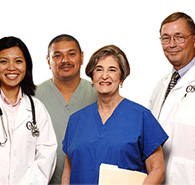Wanted: More Health Workers
by Siegfried Othmer | August 5th, 2008
 So pronounces the headline in the Los Angeles Times. Needed are allied health professionals, those of lesser credentials who nevertheless are crucial to the medical enterprise. Involved here are some two hundred occupations ranging from respiratory care practitioners to radiographers to paper pushers. These allied professionals make up some 60% of the labor pool in the health care system. The greatest projected need appears to be among pharmacy techs, dental hygienists, and physical therapy assistants.
So pronounces the headline in the Los Angeles Times. Needed are allied health professionals, those of lesser credentials who nevertheless are crucial to the medical enterprise. Involved here are some two hundred occupations ranging from respiratory care practitioners to radiographers to paper pushers. These allied professionals make up some 60% of the labor pool in the health care system. The greatest projected need appears to be among pharmacy techs, dental hygienists, and physical therapy assistants.
The author obviously doesn’t know about neurofeedback yet. It is worth remarking that in our experience we are taking part in the growth curve of health care rather than being caught up in the impending recession. Neurofeedback clinics are busier than ever before. Inquiries are ramping up. The services we offer are not optional for many people, and that factor will dominate in our growth as skepticism regarding neurofeedback is increasingly discredited. More professionals are moving from mere curiosity to active involvement with neurofeedback.
In various ways neurofeedback is appearing on the scene as a “just-in-time” modality. Our society will undergo enormous stresses in coming years as the hangover from our orgy of fiscal excess is overcome. The growing problem of mental dysfunction in the elderly combines with burgeoning issue of educational failure among the young to present a significant challenge to our society for which the neuromodulation technologies in general, and neurofeedback in particular, present the only viable remedy currently available. And in the middle age range we have the returning veterans and the generally stressed-out middle class, for whom neurofeedback also presents a reprieve.
In the hierarchy of healthcare needs, mental health ranks near the top even within the current diagnostic framework. We have noted before that depression already ranks at the top of world rankings in terms of useful life years lost (with the exception of childhood diseases in the developing countries). If proper account were taken of mental causation of medical disorders (cancer, heart disease, stroke, diabetes, obesity, substance abuse and addiction), the central role of mental health would loom large indeed. Resources committed to mental health should therefore also rank near the top, and would surely do so if only an affordable remedy with predictable outcomes were available. With the field of neuromodulation opening up, that moment has arrived.
From the larger societal perspective, nothing could have a greater impact on our collective quality of life than improving emotional regulation across the board; elevating executive function and cognitive function generally; remediating pain syndromes; resolving psychological trauma; and allowing an ever larger fraction of our citizenry to set upon a pathway toward self-actualization. Neurofeedback / EEG biofeedback is the key to all of these objectives, and at the moment there is no known alternative.
With the perspective of looking back on our second Gilded Age we can project that the next major turn in our society is going to involve a reappraisal of our values and hence a turn inward in order to reconstruct and reorient our value hierarchy. It will involve a rediscovery of community and of cooperation as a counterweight to naked competition and untrammeled individualism. Neurofeedback can provide a solid foundation for that project, as we refurbish and solidify our inner resources and once more wind up our moral gyroscope. The emergence of a healthy state of self-hood is a precondition for rebuilding and sustaining societal relationships.
Fortunately, the practice of neurofeedback is among the most accessible of disciplines for the interested healthcare worker. Anyone with sensitivity to the “state of the other” can readily acquire the skills to be immediately productive in this field. As the economy at large enters more choppy waters, potential practitioners should be reassured by the great potential of this field, which is just at the beginning of becoming realized.
Share your thoughts in the comments section below.





